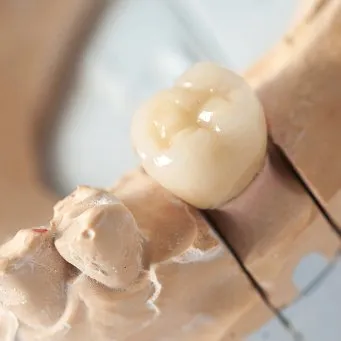Dental Implants
What are Dental Implants?
A dental implant is a small ‘anchor’ made of titanium that is inserted into the jawbone to take the place of your missing tooth root. After osseointegration (when the surrounding bone has healed to the implant), a replacement tooth is secured to the top of the implant. This new tooth looks, feels and performs similarly to your natural tooth.

What are the benefits?
- Looks, feels and performs similarly to your natural tooth
- Helps preserve surrounding bone by replacing the tooth root
- Helps prevent bone loss and jaw line recession
- Does not compromise your adjacent teeth to support a bridge
- Restores a more secure biting ability than a removable denture
- Restores self-confidence and appearance
- Improves appearance and self-esteem
- Requires similar oral care as a natural tooth

Book Your Visit At
Dental Smile Frankston
Book Online or Call at 03 9783 3215
We are a locally owned and operated company

Implant retained overdentures
If you are missing all of your teeth in the upper and/or lower jaw and are currently using a removable full denture, then an implant-supported denture could be the right solution for you. Unlike removable full dentures which can fit poorly and cause gum irritation, implant-supported bridges or dentures virtually eliminate slipping and movement so there’s no pain, no embarrassment and no worries.

Advantages over traditional treatment options
- Holds the denture in place
- Helps preserve surrounding bone by replacing the tooth root
- Helps prevent bone loss and jaw line recession
- Restores a more secure biting ability than traditional removable dentures
- Improves appearance and self-esteem
- Provides comfort and security in knowing the denture won’t dislodge
FAQ
Am I suitable to have a dental implant?
Dental implants are suitable for most adults with good general health. They can only be used once the jawbone has stopped growing and so generally are not used with younger patients.
Habits such as heavy smoking and poor oral hygiene can increase the number of problems associated with initial healing and thereafter may be bad for the long-term health of gum and bone surrounding each implant. The dentist may decline to place implants if smoking cannot be reduced or given up altogether.
What do I need to be aware of before getting a dental implant?
When you first enquire about dental implants it is often in response to an awareness of ongoing dental problems or the recent loss of teeth. The cause of these problems will need to be understood and treated before undertaking implant treatment.
If you are aware of bad breath, loose teeth or have noticed excessive bleeding, particularly when your teeth are cleaned professionally, you may have gum problems. Gum disease (periodontal disease) is a major cause of bone loss, and with reduced bone, dental implant treatment can be more complicated.
How long does the treatment take?
For routine cases, from the time of implant placement to the time of placing the final crown, it can vary between 3 to 6 months. The availability of better quality bone can be used to decrease treatment time, whilst more time and care must be taken with poorer bone, which can, therefore, extend treatment times beyond 6 months.
How long will the implants last?
Once the implants and surrounding soft tissues are seen to be healthy and the new teeth comfortable and correctly adjusted, it is the quality of your personal attention to oral hygiene and willingness to attend regular maintenance reviews that will have the most influence on how long they will last.
When poorly cared for, implants will develop a covering of hard and soft deposits (calculus and plaque), which is very similar to that found on neglected natural teeth. Untreated, these deposits can lead to gum infection, bleeding, soreness and general discomfort. It could probably be said that implants will last as long as natural teeth.
Well-maintained implants placed into adequate bone can be expected to last for many years and possibly for your lifetime. However, just as you would expect conventional crowns, bridges and fillings to need occasional repairs or replacements, implants may also have similar maintenance requirements over the years.
What costs are involved in implant treatments?
The cost can vary, depending on the degree and extent of treatment required. The full cost is therefore explained and confirmed in a written treatment plan prior to the start of treatment.



